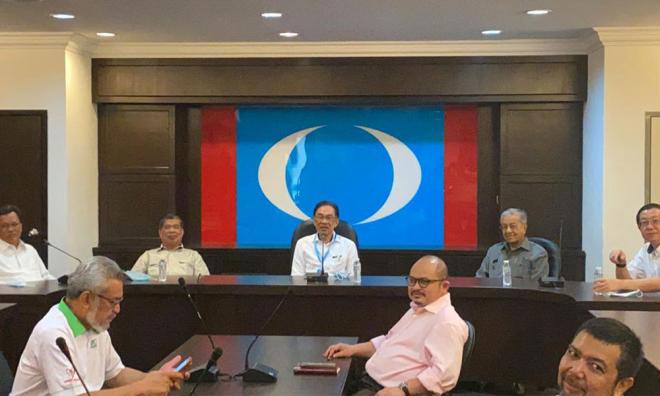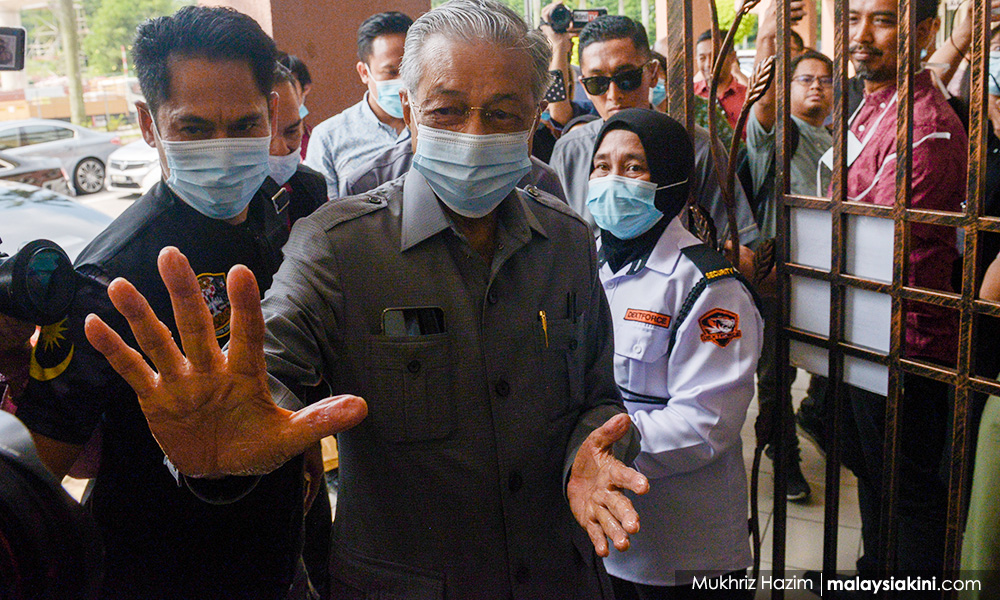Harapan’s last dance?

Bridget Welsh, Malaysiakini
Over the past week, the stalemate over the leadership and composition of Pakatan Harapan Plus (or Minus) has been on show in public.
Pictures of all-male politicians meeting, socially distant from each other, illustrate the political distance these elites have from both a viable solution and from the electorate at large. This uneasy distrustful leadership contestation has been ongoing throughout the Harapan government and was decisive in leading to its collapse.
What is new now is that the parties are facing head-on the intractable leadership issue and they are being asked to choose in a context where it is increasingly hard to win national government. Splits within Harapan and its Plus partners are widening and hardening.

Pakaran still cannot agree whether Mahathir or Anwar should be the Prime Minister
With elections increasingly on the horizon and disengagement among the electorate, a failure to reach a compromise could very well mean the negotiations are a last opportunity in the short and medium-term for Harapan to hold national power.
Another turn?
Dr Mahathir Mohamad wants to return to power – a last time to lead. Why he wants a return at the age of almost 95 years old remains a mystery – to be back in control, to address the abuses of the Najib Razak administration that was not addressed in the 21 months he was in office, to correct his mistakes of using divide-and-rule tactics to break apart the coalition, to finally honour his promise to pass the baton, to introduce the reforms he said he would do … the list can go on.
Mahathir nevertheless brings the ‘plus’ numbers with him who only want to partner with him and ultimately comprise the numbers to form a potential majority government – to give Harapan a possible chance to return to power as a coalition as long as there are enough numbers (at least 120 for a stable majority) and clarity in who is in charge.
Anwar wants to cut in – or rather his own leadership. As he believes he brings more dancers to the party, he is demanding more. He is under the illusion that he is in a position of strength, not fully appreciating that many within Harapan (and some within his own party) are also eager to join with Mahathir and are increasingly frustrated that Anwar’s main concern appears to hog the dance floor for himself.
Anwar’s party, PKR, is not the largest in the coalition – and this means compromising with the other political parties. Anwar has apparently failed to understand from the get-go that GE14 was not his mandate, but a shared one for reform and change.

Anwar refused to commit himself to the deal and asked for one week to think about it
Given the electoral realities – not least of which are persistent divisions in his own PKR – the chances of Harapan winning more seats in new polls at this juncture are slim. They face an uphill challenge holding onto the current seats they have, with at least a third of the seats at serious risk, mostly for Amanah, PKR and the Bersatu-Mahathir camp.
Support levels may change as the realities of an economic downturn and voter anger at continued dolling out of patronage and ‘political survival’ settlement deals continue, but the obstacles of securing power through the ballot box are many and high. It may indeed be the case that all the political dancing in Harapan may never get any of the contenders to lead.
Risky manoeuvres?
There are three risks of this dance. First of all, it will fail and with failure, there will a deepening of resentment and blame game.
Both Mahathir and Anwar will be damaged – as they proved they could not put aside personal distrust. There is not enough appreciation about how much alienation and fatigue have already happened, both within the political parties and with the public at large. Increasingly, Malaysians are looking past both leaders. More, including Harapan supporters, want younger leaders, alternatives to both men.

Mahathir wants at least 6 months more as PM9
Second, the effects of a failed stalemate will leave long-term damage on Harapan. For now, it appears on the surface as if all the parties are united, but relationships are being frayed and tested by yet another round of elite fighting – fighting among themselves rather than for the well-being of Malaysia. Failing to come together will cut and scar Harapan and leave lasting divisions within individual parties.
While unwanted by most, the risks of a break-up of Harapan are increasing. There are differences not only over who should lead Harapan, but also whether these elite negotiations should be carried out at all.
Many within Harapan believe that the focus should be on regaining the trust of the electorate rather than engaging in another elite ‘negotiation’ – one that only reinforces and reminds the public of the leadership problems Harapan had while in office. Others believe it is important to pull numbers together and try to return to power.
Further erosion of public trust will especially impact Anwar, as this is Mahathir’s last chance. It is Anwar who will have to pick up the pieces from how the negotiations unfold – or don’t. The pieces may in fact end up quite divided.
A third effect of this open stalemate is that the public display of Harapan Plus meetings further pushes those wavering in support for Perikatan Nasional (PN) into the PN camp. This has already happened with defections in the past few weeks. PN is aggressively seeking numbers and the pressure/offers are likely to further intensify between now and the next parliamentary sitting (currently scheduled for July).
They are taking place at both state and national levels as Muhyiddin and Azmin aim to secure their majority by hook or by crook. Timing is important when dancing. If you are too late, you miss the chances you have.
Different music
Ultimately, these dancers seem to have forgotten that they are being watched. They believe they are dancing for the benefit of the public, but that is not clear to everyone. The public hears a cacophony of noise without harmony.
The negotiations apparently lack substantive discussion of policies or problem areas that have bogged down Harapan. With highly personalised negotiations, the impression is that these meetings are about power, not the people. Repeated calls to clarify priorities, set up a shadow cabinet and build common ground that shows purpose to the electorate have not been listened to.
Malaysians want political stability and programmes that provide hope for their future. Harapan needs to move toward providing a reason to support them rather than believing they have support, and thinking that ‘stopping Najib and anti-Umno sentiment’ is enough for voters.
No question, public views of the players and this elite dance for power differ sharply – people hear very different songs. There are those who like the Mahathir beat – still believing in the music of the 1980s, a mix of Duran Duran’s ‘Hungry Like the Wolf’ and Lionel Richie’s ‘All Night Long’.
Others shout and respond with Michael Jackson’s ‘Beat It’ and Cyndi Lauper’s ‘Time After Time’. They think of the battle in terms of Survivor’s ‘Eye of the Tiger.’ Those supporting Anwar hear more of the 1990s songs – Smashing Pumpkins’ ‘Tonight, Tonight’, Montell Jordan’s ‘This is How We’ll Do It’ and a bit of the Spice Girls’ ‘Wannabe’.
The public on its part is hearing ‘hip hop’ – and not the talented songs of Public Enemy, DJ Kook Herc, Afrika Bambaataa, Dr Dre, Notorious B.I.G., Eminem, Nikki Minaj, Lil Wayne and Kendrik Lamar, to name just a few of the many great artists. The messages and beat of this dance are not connecting and the beat is off. All people see is the hopping, not the hip or hype.
It is a mistake to take public support for a Harapan return to power for granted – it needs to be earned and the outreach to the public strengthened. It is a mistake to take partners for granted as well.
Opposition to a Mahathir return is strong, and doubts about Anwar’s leadership and Harapan’s effectiveness to manage Covid-19 and the economy have yet to be addressed. Even if Harapan’s negotiations succeed, there is no guarantee the numbers will be sufficient and stable enough to secure power. Moreover, the absence of a plan to govern as opposed to a timeline for succession will make any dancing irrelevant.
For now, Harapan’s latest dance is still on, but the realities of everyone dancing apart remains. The longer the dancing goes on, the chances of separating grows, and the dance transforms into a dream instead.
BRIDGET WELSH is a Senior Research Associate at the Hu Fu Centre for East Asia Democratic Studies, a Senior Associate Fellow of The Habibie Centre, and a University Fellow of Charles Darwin University. She currently is an Honorary Research Associate of the University of Nottingham, Malaysia’s Asia Research Institute (Unari) based in Kuala Lumpur.

